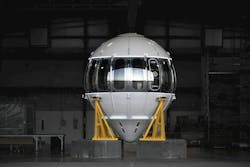TITUSVILLE, Fla.,. - Commercial spaceflight company Space Perspective in Titusville, Fla. unveiled its first completed test capsule Spaceship Neptune, which it has named Excelsior.
Space Perspective says Excelsior is the largest spacecraft - barring space stations - in operation. The pressurized spherical capsule is 16 feet in diameter and has a volume of 2,000 cubic feet. Space Perspective notes that the volume is approximately twice that of Virgin Galactic and Blue Origin's offerings, and about four times that of SpaceX's Crew Dragon.
The Spaceship Neptune capsule will be brought to an altitude of 100,000 feet above Earth via a lighter-than-air SpaceBalloon and features a reserve descent system while the capsule structure features vertical windows, and the splash cone, which attenuates the capsule to provide a gentle ocean landing and then becomes a sea anchor to stabilize the capsule.
Operational partners supporting test capsule completion included Llamas Plastics, Keyence, Siemens, Epsilon3, Dolphitech, ViRTEK, Rescale, Sims Crane, PCI Composites, Andromeda Systems Inc., and RS&H Aerospace Solutions.
Related: NASA selects Phantom Space Corp. for commercial CubeSat launch
With no rockets, weightlessness, heavy g-forces, or training required, the experience is designed gentle. Those who fly with Space Perspective, which is being regulated by the FAA as well as the U.S. Coast Guard and follows guidelines established by NASA, enjoy meal and cocktail service, Wi-Fi, and views through what Space Perspective says are the largest windows ever flown to space, and a proper restroom, which it calls the Space Spa.
In 2021, Space Perspective flew a capsule simulator to 100,000 feet under its SpaceBalloon; since then, its teams have been designing and building a pressurized capsule to resume testing, which will include evaluating all systems, corners cases, and off-nominal scenarios to pass numerous safety gates. With the spaceship components now complete, a series of uncrewed test flights will begin soon off the coast of Florida. Data gathered during those flights will pave the way for the parallel development of human-rated capsule and crewed test flights later this year.

